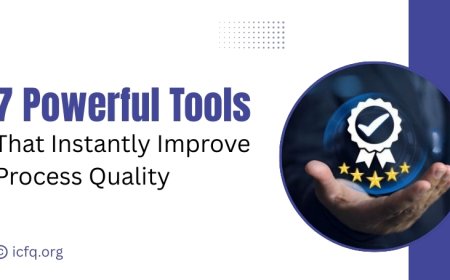Benefits of Six Sigma Certification
Discover the benefits of Six Sigma Certification. Enhance your skills, boost career prospects, and drive organizational success with Six Sigma methodologies.

Understanding Six Sigma certification can make a big difference. Whether you're learning Six Sigma courses, considering Six Sigma certification options, or exploring Lean Six Sigma courses, grasping the benefits of Six Sigma online courses is important. These programs, like Six Sigma Green Belt and Six Sigma Black Belt, teach structured methods that improve how organizations work and their quality. Professionals with Six Sigma certification are skilled at finding and fixing problems in processes. This helps organizations run better and keeps getting better over time. Using data to make decisions is key in today's business world, and Six Sigma courses teach this approach.
Also, Six Sigma courses give people skills that work in many industries, from healthcare to making things. Learning to analyze data and solve problems helps Six Sigma certification holders lead projects that make businesses grow and improve. Getting good at Six Sigma certification shows you know your stuff and can get better jobs. Learning about Six Sigma online courses can help you and the company you work for do better and move up.
Understanding the Importance of Six Sigma Certification in Career Growth
Earning a Six Sigma certification can greatly enhance your career opportunities. Six Sigma methods are well-known for their effectiveness in improving processes and managing quality. They provide professionals with a structured way to solve problems and make decisions. Whether you pursue a Six Sigma Yellow Belt, Green Belt, or Black Belt, or aim for a Six Sigma Master Black Belt, each level equips you with valuable skills that are useful across various industries. Employers highly value candidates with Six Sigma certifications because these credentials show your ability to streamline operations, cut costs, and boost overall efficiency. They also validate your expertise in statistical analysis and project management, demonstrating your dedication to continuous improvement and high standards.
Whether you want to advance in your current job or switch to a new career path, Six Sigma certification offers a strong framework to effectively lead quality improvement projects. With options like Six Sigma Lean Certification and other specialized tracks available, professionals can tailor their certification to meet specific industry needs. This makes them invaluable assets in today’s workplaces, which prioritize data-driven decisionmaking and efficiency.
Challenges Without Six Sigma Certification in Today's Job Market
Six Sigma is a method that focuses on improving how businesses work and cutting down on mistakes. It's required in many fields like manufacturing, healthcare, and finance. Without Six Sigma certification, it's tougher to find a job or move up in your career. Employers like to see that you know how to make processes better and use data to make decisions—things Six Sigma teaches you.
People without this certification might have trouble proving they can make operations smoother, improve quality, and make a company work better. This means they might not get the chance to earn more money or take on leadership roles. Getting a Six Sigma certification doesn't just teach you new skills. It shows employers that you're serious about always getting better—a trait they really like in today's job market.

How Can Six Sigma Certification Boost Your Career and Help Your Company Succeed?
1. Career Advancement:
-
Improved Skills: Six Sigma certification teaches advanced problem-solving and process improvement skills, making you more valuable to any company.
-
Competitive Advantage: Being certified shows your dedication to quality and efficiency, setting you apart from others who aren't certified.
-
Promotion Opportunities: Many companies prefer certified individuals for leadership roles because they can drive continuous improvement.
2. Benefits for Companies:
-
Better Processes: Implementing Six Sigma principles leads to smoother operations, fewer mistakes, and happier customers.
-
Cost Savings: By cutting waste and optimizing processes, companies save money and use their resources better.
-
Enhanced Reputation: Meeting Six Sigma standards boosts a company's reputation for quality and reliability, attracting more customers and business.
3. Points to Cover:
-
Skills Development: Describe the specific skills you gain from Six Sigma training.
-
Industry Value: Explain why Six Sigma certification is respected across different industries.
-
Career Opportunities: Explore the different career paths and job opportunities available to certified professionals.
-
Impact on Companies: Provide examples of companies that have improved thanks to Six Sigma.
4. Ideas for Content:
-
RealLife Examples: Share stories of people and companies that have used Six Sigma to succeed.
-
Expert Advice: Interview professionals or experts in Six Sigma for practical tips and insights.
-
FAQs: Answer common questions about how to get certified, the costs involved, and the benefits.
-
Success Stories: Include testimonials from people who have advanced their careers or helped their companies with Six Sigma certification.
Including the term "Six Sigma certification" throughout will ensure readers understand the focus of the content.
Exploring the Benefits of Six Sigma Certification
If you're looking to boost your career in quality management, getting a Six Sigma certification can be a smart move. Here are the valuable advantages you can expect from pursuing this credential:
1. Better Job Opportunities: Six Sigma certification gives you skills that are highly valued across different industries. Companies worldwide prefer professionals who can streamline processes and reduce errors, making you an important part of any team.
2. Improved ProblemSolving: Six Sigma training focuses on DMAIC (Define, Measure, Analyze, Improve, Control) methodology. This helps you become better at finding problems, understanding their causes, and coming up with effective solutions. This structured approach not only makes organizations more efficient but also sharpens your ability to solve problems.
3. Cost Savings and Efficiency: By using Six Sigma principles, companies can save a lot of money by reducing waste, using resources better, and improving processes. As a certified Six Sigma expert, you'll help make these improvements and directly help the company save money.
4. Recognition and Trust: Having a Six Sigma certification shows that you care about quality and always try to get better. It proves that you have the skills and knowledge needed, which can make employers and other professionals trust you more.
5. Leadership Opportunities: Six Sigma certification is often connected to leadership roles in companies. Whether you want to lead projects that make quality better or become a manager, this certification gives you a good base to move up in your career.
6. Used Everywhere: Six Sigma methods are known and used all over the world, so this certification can be used in lots of different jobs. Whether you work in making things, healthcare, computers, money, or something else, Six Sigma can be used to make things better and get good results.
By getting a Six Sigma certification, you can make yourself better at work and show that you can help your company do better too. If you want to move up in your job or find a new job, knowing Six Sigma can help you do it. For more details about Six Sigma certification and how it can help you, visit ICFQ. They have lots of information and tools to help you move forward in quality management.





























